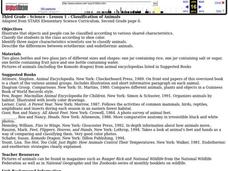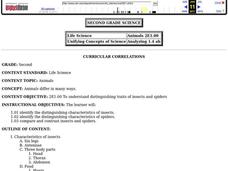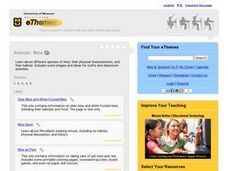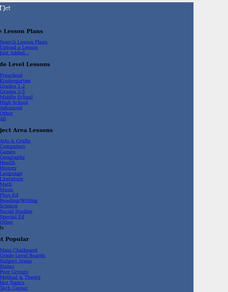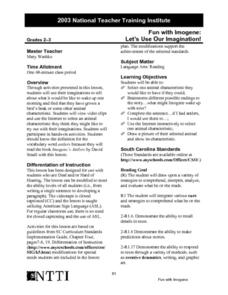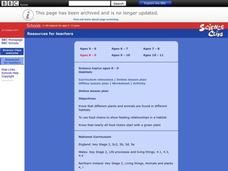Curated OER
Classification of Animals
Third graders practice classiyfying items and identify three major characteristics scientists use to classify animals. They describe the differences between ectothermic and endothermic animals.
Curated OER
Animals
Second graders explore the ways in which animals differ. They discuss the characteristics of insects and spiders. Students identify the characteristics of insects and spiders. They compare and contrast insects and spiders.
Curated OER
Learning About Animals' Bodies
Students research different animals (mammals, reptiles, amphibians, insects, birds, fish) and create books, murals, dioramas, puppets, and sculptures to illustrate the necessity of various body parts for overall survival. In this animal...
Curated OER
Animals and Their Needs
Students identify the characteristics of living things and examine objects to see if they are living. They identify the needs of living things, in particular of animals and animal babies. They discuss how to care for pets.
Curated OER
Mythical Animals
Students create imaginary animals by assembling pictures of body parts from pictures of real animals. This is one of three linked tasks. The others are "Who's Parts Do I Have?" and "Animals Piece by Piece."
Curated OER
Animals Piece by Piece
Young scholars sort organisms and objects into groups according to their parts and describe how the groups are formed.They identify body parts of animals from puzzle pieces, assemble the puzzle, and name the animal.
Curated OER
Animals: Mice
Young scholars use the Internet to examine the different species of mice, their habitat, and their physcial characteristics.
Curated OER
Traits of Living Things
In this characteristics of living things worksheet, students will brainstorm five traits of living things and fill in a graphic organizer.
Curated OER
What is an animal?
For this animal worksheet, students determine five characteristics that all animals have in common. Using these characteristics, students fill in a table demonstrating what living things have those characteristics.
Curated OER
Zoo Animal Facts
Students create a fact sheet naming an animal's habitat, distinguishing characteristics, eating type, country of origin, and any interesting information that they research. They illustrate their fact sheet and sheets are compiled into a...
Curated OER
What Kind Of Mammal Is It?
Learners describe the characteristics of a mammal. They also differentiate between a companion and a wild animal. The lesson has an assessment included in it. They have a discussion to tap prior knowledge about what a mammal is.
Curated OER
What is an animal?
In this animal worksheet, students determine which characteristic of an animal matches the given statement. Students describe illustrations of animals using the terms radial symmetry, bilateral symmetry, and no symmetry.
Curated OER
It Bears Repeating!!!
Students research bears and their characteristics with a specific study on North American bears and polar bears. In this bear study lesson, students read books about polar bears and wild bears. Students complete activities to further...
Curated OER
What is an Animal?
In this animal worksheet, students review characteristics of animals including body symmetry, development, and skeletal structure. This worksheet has 3 short answer questions.
Curated OER
Animal Diversity
Students explore biology by completing science worksheets in class. In this animal anatomy lesson, students read the book The Adventures of Marco and Polo and identify the animals mentioned in it. Students examine a real life animal and...
Curated OER
Fun With Imogene: Let's Use Our Imagination!
Learners research animal characteristics and use their imaginations to tell about what it would be like to wake up one morning and find that they have some animal characteristic. They read Imogene's Antlers by David Small.
Curated OER
Polar Pals: Polar Bears & Penguins
First graders complete a variety of activities about polar bears and penguins including the "Blubber Mitten" experiment. They culminate the unit by creating a visual representation comparing and contrasting the two animals.
Curated OER
Habitat, What is That?
Students explore animal habitats. In this environmental stewardship lesson, students match animals to their habitats in a classroom activity. Students also observe a firefly habitat and read Fireflies. Students create bulletin boards...
Curated OER
Who's Who?
Students explore biology by identifying animals and their environments. In this animal characteristic instructional activity, students read assigned text about farm animals, how they are raised, and what they are used for in our society....
Curated OER
Classy
Students explore the classification system in this seven lessons unit. The diversity of life forms and their characteristics are examined using a microscope. Kingdoms, classes, and families are investigated.
Curated OER
Why Do We Have Two Eyes?
Animals eyes are the focus of this science worksheet. Students match explanations of an animal's need for two eyes to corresponding pictures of the animals. Students write the identity of four animals.
Curated OER
Animal Tracks
Second graders study the different tracks that animals make. They identify similarities and differences in the tracks and formulate opinions based on facts.
Curated OER
4-H Cat Activity Page
As part of a unit on animals, this would be an interesting activity for upper elementary and middle school students. The 40 question activity could be linked to a research activity on animals or pets.
Curated OER
Habitats
Students investigate the habitats of living things and the cycle of the food chain. In this scientific inquiry online lesson, students examine the habitats of plants and animals as well as the food chain as they sort pictures of living...


